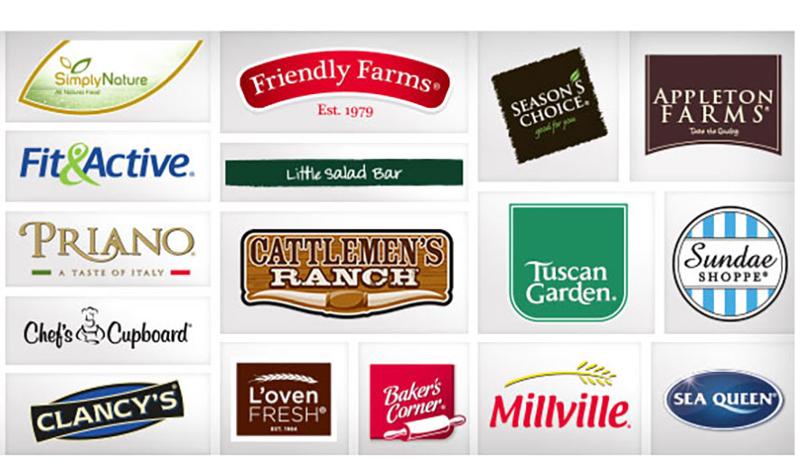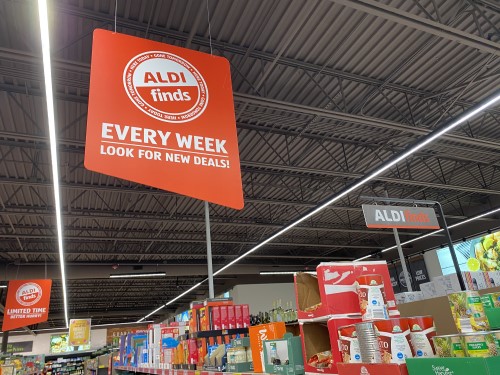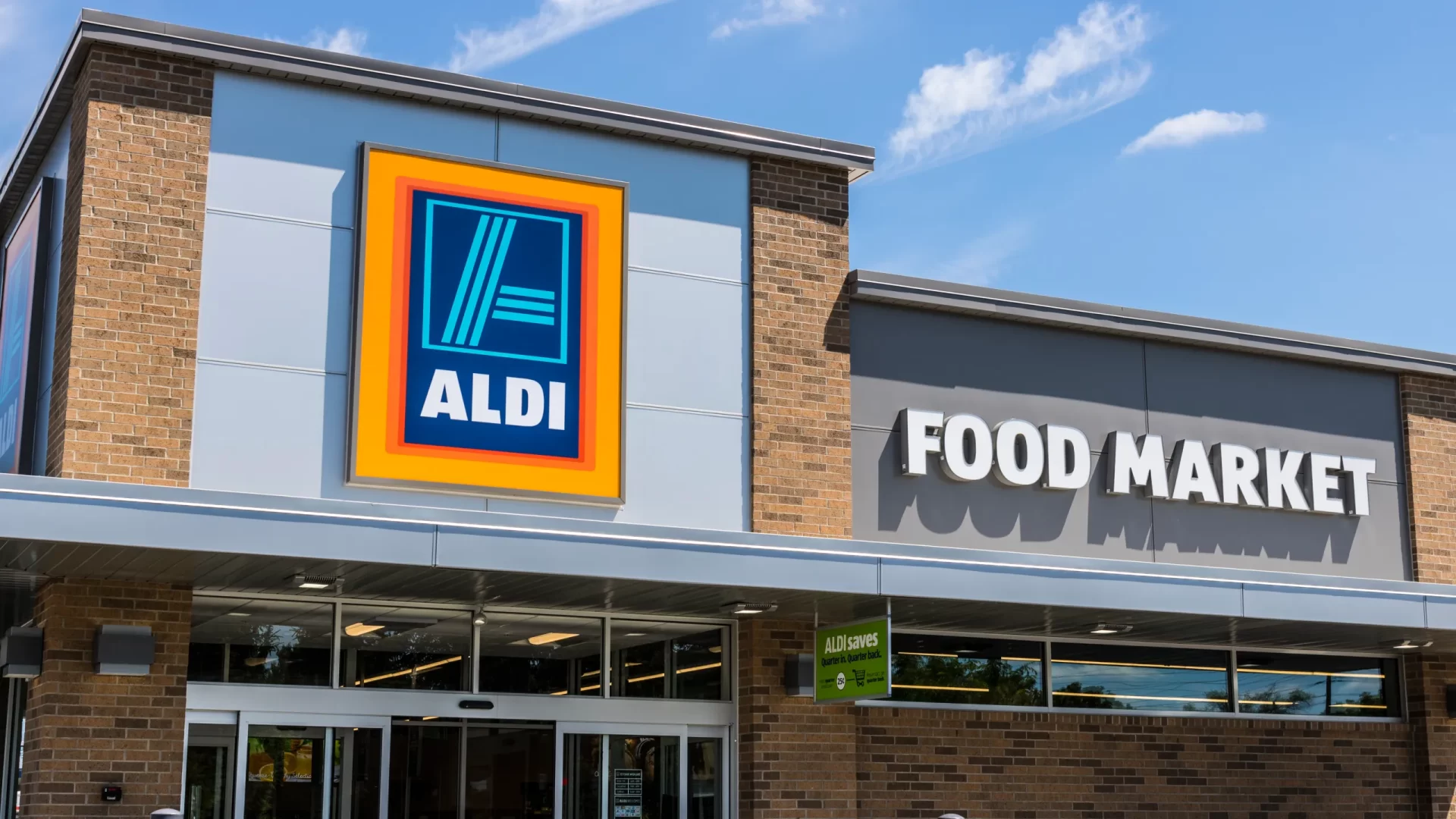Aldi, the name whispered with reverence by budget-conscious shoppers and met with raised eyebrows by the uninitiated, is a retail enigma. More than just a discount grocery store, it’s a carefully crafted experience, a global phenomenon, and a testament to the power of efficiency, quality, and innovation. Founded in 1946 by the Albrecht brothers in Germany, Aldi has grown into two independent chains, Aldi Nord and Aldi Süd, operating over 12,000 stores across 18 countries. But what truly sets Aldi apart? Let’s delve into the heart of this retail giant, unpacking its secrets and understanding its enduring appeal.

Firstly, efficiency is woven into Aldi’s DNA. Unlike sprawling supermarkets overflowing with choices, Aldi stores are compact and streamlined. You won’t find endless aisles or duplicate brands. Instead, they offer a curated selection of private label products, meticulously chosen for quality and value. This laser focus allows them to negotiate lower prices with suppliers, savings they proudly pass on to customers. But efficiency doesn’t stop there. Aldi encourages customer bagging, reducing labor costs and promoting environmental responsibility. Additionally, innovative store layout and product placement keep checkout lines swift and minimize restocking time.
Secondly, quality takes center stage at Aldi. Despite its discount image, Aldi is adamant about offering quality products. They partner with reputable suppliers and have stringent quality control measures in place. This commitment is reflected in numerous independent taste tests and consumer surveys, where Aldi’s private label brands frequently hold their own against national name brands. This balance between affordability and quality is a key driver of Aldi’s loyal customer base.
Thirdly, the “treasure hunt” aspect adds to the Aldi experience. Unlike the predictable shelves of most supermarkets, Aldi’s product offerings constantly evolve. New private label items appear weekly, often replacing existing ones. This “limited-time only” approach keeps customers returning, excited to discover new finds and score deals. It fosters a sense of community and shared excitement among Aldi devotees, who eagerly discuss their latest hauls and discoveries online and in person.
Sustainability is becoming an increasingly important facet of Aldi’s identity. They are committed to reducing their environmental footprint, implementing initiatives like recyclable packaging, energy-efficient stores, and responsible waste management practices. This resonates with modern consumers who seek ethical and eco-conscious shopping options, further solidifying Aldi’s appeal in a changing market.
Aldi is more than just a place to buy groceries; it’s an experience, a community, and a testament to the power of doing things differently. By understanding its core principles and unique approach, we gain a deeper appreciation for this global phenomenon and its continued impact on the grocery landscape. Stay tuned as we explore further into the world of Aldi, uncovering its product offerings, shopping tips, and the secrets behind its fiercely loyal customer base.
Marketing Strategies of Aldi
Aldi, the global discount grocery chain, thrives on more than just low prices. Their success stems from a carefully crafted combination of marketing strategies that target budget-conscious shoppers, prioritize value, and create a unique shopping experience. Let’s explore their top strategies:
1. Efficiency-driven Pricing
Aldi’s secret weapon isn’t flashy marketing or endless aisles; it’s efficiency. They’ve built a cost-cutting machine that translates directly into lower prices for you. This efficiency-driven pricing strategy has several key elements:
- Lean and Mean: Smaller stores, fewer products (around 1,400!), and streamlined operations keep costs down. They buy in bulk and source locally, further amplifying savings.
- No Frills, All Value: Forget fancy displays and endless coupons. Aldi focuses on offering everyday low prices, attracting value-conscious shoppers from all income groups.
- Simple and Efficient: Fewer employees per store means higher wages and better training, translating to excellent customer service. Plus, a quick, no-frills shopping experience saves you time.
This strategy isn’t just good for your wallet; it’s sustainable. With less waste and a smaller carbon footprint, Aldi proves that doing good can also mean good business. So, next time you’re looking for quality groceries at unbeatable prices, consider visiting Aldi – the efficiency expert working for your benefit.
2. Private Label Powerhouse
When it comes to groceries, Aldi doesn’t rely on big brand names to attract customers. Instead, they’ve built their empire on a powerful private label strategy, offering high-quality products at significantly lower prices. This approach has made them a force to be reckoned with in the retail industry.

The heart of Aldi’s strategy lies in its impressive variety of private label brands. These aren’t mere generic knock-offs; they’re carefully crafted alternatives, often winning taste tests and awards against their national brand counterparts. With 90% of their products under private label, Aldi gains complete control over pricing and availability, allowing them to offer exceptional value to their customers.
But Aldi doesn’t stop there. They go a step further by partnering with local vendors to source their private label products. This not only helps them maintain competitive pricing but also fosters stronger community ties and promotes responsible sourcing practices. Furthermore, they’re constantly moving upmarket with their private label offerings, expanding into organic, vegan, and vegetarian categories, ensuring they cater to diverse customer preferences while maintaining their core values of consistency, simplicity, and responsibility.
By prioritizing quality, value, and responsible sourcing, Aldi’s private label strategy has proven to be a winning formula. It allows them to stand out in a crowded market and offer a compelling reason for customers to choose their stores over the competition. This success story makes it clear: sometimes, the biggest brands aren’t necessarily the best, and private labels can hold the key to unlocking customer loyalty and market dominance.
3. The “Treasure Hunt” Experience
While many grocery stores focus on consistency and predictability, Aldi takes a different approach. They’ve built a loyal following through their unique “treasure hunt” experience, injecting an element of surprise and excitement into the shopping routine.
This strategy, known as ALDI Finds, involves introducing new, limited-time items every week. These aren’t just everyday essentials; they span a diverse range, from unique food items to home goods, workout equipment, furniture, and décor. This keeps customers coming back, eager to discover what unexpected gems they might unearth.

Some might describe this shopping experience as akin to foraging or hunting and gathering. Unlike meticulously organized aisles, Aldi offers a simplified layout where you stumble upon these exciting finds amidst their core offerings. This deliberate departure from the norm fuels the thrill of discovery and creates a differentiating brand experience.
But it’s not just about excitement. Aldi balances their treasure hunt approach with their core value of offering low prices. They achieve this by selling merchandise out of cartons, reducing stocking costs, and charging a nominal fee for bags, keeping overall expenses low. This allows them to pass on the savings to customers, ensuring the excitement doesn’t come at a premium.
4. Embracing Social Media
In a world where social media buzz can make or break a brand, Aldi has mastered the art of online engagement. With millions of followers across Facebook, Instagram, and Twitter, they’ve carved a unique space, embracing humor, relatable content, and creative strategies to build a loyal online community.
Their secret sauce? A dash of wit, a pinch of surprise, and a whole lot of personality. Their Twitter feed is a haven for hilarious content, poking fun at themselves and engaging in playful banter with other brands. This lighthearted approach resonates with audiences, turning their social media presence into a platform for genuine connection and entertainment.
Beyond humor, Aldi leverages trending events and hashtags to tap into existing conversations and amplify their message. They’ve even utilized social media for viral marketing, with some tweets, like their response to a high court case, generating tens of thousands of likes and retweets. This ability to capitalize on real-time moments keeps their content fresh and relevant, further solidifying their social media presence.
However, Aldi’s online strategy goes beyond viral moments. They focus on personifying the brand, creating a friendly and approachable persona that resonates with their target audience. By connecting with customers on a personal level, responding to comments, and engaging in lighthearted interactions, they foster a sense of community and brand loyalty.
5. Limited-Time Offers and Seasonal Products
In the world of retail, where consistency is key, Aldi stands out by injecting exciting variety through limited-time offers and seasonal products. This strategy keeps their customers engaged, encourages regular visits, and ultimately drives sales.
Their flagship program, ALDI Finds, embodies this approach. Every week, new, limited-edition products hit the shelves, spanning categories like seasonal food items, festive décor, and even gifts. This treasure trove of unique offerings changes rapidly, creating a sense of urgency and excitement that entices customers to return frequently to see what gems they might unearth.
Beyond ALDI Finds, they curate limited-time product lists for holidays, ensuring you find everything you need for celebrations without breaking the bank. And, their Hot Deals section offers heavily discounted items, available only for a short period, encouraging quick grabs and impulse purchases.
This strategy extends beyond groceries. Their weekly “Special Buys” feature limited-time deals on non-grocery items like clothing, electronics, and home goods. This diverse range caters to various needs and creates a constant stream of new discoveries, attracting customers who might not consider them for everyday essentials.
By masterfully blending limited-time offers and seasonal products, Aldi keeps things fresh and exciting. This ensures their stores are always worth a visit, fostering customer loyalty and driving sales through the thrill of the hunt and the allure of exclusive products. It’s a strategy that proves sometimes, the best way to stand out is by offering something that doesn’t last forever.
6. Focusing on Specific Customer Segments
Aldi understands that a one-size-fits-all approach doesn’t work in the grocery market. Instead, they’ve built a successful brand by focusing on specific customer segments and tailoring their offerings accordingly.
Firstly, they target budget-conscious consumers, appealing to individuals with low-to-mid-level incomes. This focus extends to their geographic segment, prioritizing suburban and rural populations where affordability is often a key concern.
Their strategy revolves around two core pillars: product differentiation and pricing. They offer higher discounts, reaching up to 30%, compared to competitors. Additionally, they emphasize private label brands, allowing them to offer lower prices without compromising quality. This no-frills approach resonates with their cost-conscious audience.
But affordability isn’t their only focus. Recognizing the growing demand for healthier options, they offer an extensive selection of organic, gluten-free, and vegan foods. They also prioritize fresh meats, fish, and produce, ensuring a well-rounded selection that caters to diverse dietary needs.
By carefully crafting these marketing strategies, Aldi has carved a unique niche in the grocery landscape. They offer a compelling alternative for budget-conscious shoppers, prioritizing value, quality, and a distinct shopping experience. As they continue to adapt and innovate, Aldi’s impact on the grocery industry is sure to grow even stronger.
Marketing Mix of Aldi
Aldi, the grocery giant renowned for its bargain prices and unique shopping experience, has captivated budget-conscious shoppers worldwide. But what’s the secret sauce behind their success? It all boils down to a meticulously crafted marketing mix, where each element – Product, Price, Place, and Promotion – works in perfect harmony to deliver maximum value to their target audience.
1. Product
Private Label Powerhouse: Forget national brands; Aldi boasts over 90% private label products, meticulously crafted to match or even surpass national brand quality at significantly lower prices. This allows them to control costs and offer exceptional value to customers.
Treasure Trove of Variety: Beyond everyday essentials, Aldi’s ALDI Finds program introduces limited-edition, seasonal items every week, spanning food, homeware, apparel, and more. This constant influx of novelty keeps customers engaged and entices them to return for the thrill of discovery.
Catering to Dietary Needs: Recognizing the growing demand for healthier options, Aldi offers an extensive selection of organic, gluten-free, and vegan products, ensuring inclusivity and catering to diverse dietary preferences.
Freshness Focus: While private labels dominate, Aldi prioritizes fresh produce, meats, and fish, guaranteeing quality and freshness at competitive prices.
2. Price
Unbeatable Value: Aldi’s core strategy revolves around offering the lowest possible prices. They achieve this through:
- Private label dominance: Eliminating brand markups.
- Efficient operations: Streamlined store layouts, minimal staff, and efficient logistics minimize operational costs.
- No-frills approach: No fancy packaging or store displays, focusing solely on product quality and value.
Limited-Time Deals: Weekly “Hot Deals” and “Special Buys” offer additional discounts on non-grocery items, creating a sense of urgency and encouraging impulse purchases.
3. Place
Strategic Locations: Aldi prioritizes suburban and rural areas where affordability is a key concern, ensuring accessibility for their target audience.
Efficient Store Design: Stores are compact and organized, prioritizing functionality over aesthetics. This minimizes overhead costs and allows them to pass on savings to customers.
Treasure Hunt Ambiance: The limited-edition ALDI Finds section is not clearly marked, creating a “treasure hunt” atmosphere that adds to the shopping experience and encourages exploration.
4. Promotion
Social Media Savvy: Aldi leverages social media platforms like Twitter and Instagram to engage with customers humorously, using relatable content and trending events to build brand personality and community.
Limited Marketing Budget: Instead of heavy advertising, Aldi focuses on word-of-mouth marketing and positive customer experiences. Their unique approach and loyal customer base generate organic buzz and attract new customers.
Community Involvement: Aldi partners with local vendors and supports community initiatives, fostering positive brand perception and building goodwill.
Customer Centricity: Aldi prioritizes customer satisfaction, offering a no-questions-asked return policy and focusing on creating a positive shopping experience despite the no-frills approach.
Sustainability Efforts: Aldi implements various sustainability initiatives like reducing packaging waste and sourcing responsibly, resonating with environmentally conscious customers.
Employee Satisfaction: Aldi invests in employee training and offers competitive wages, fostering a positive work environment that translates into better customer service.
Aldi’s marketing mix is a masterclass in understanding and catering to their target audience. By strategically combining high-quality private label products, unbeatable prices, efficient operations, and a unique shopping experience, they’ve carved a niche in the market and earned the loyalty of millions of budget-conscious shoppers. Aldi’s success story emphasizes that value, efficiency, and a focus on customer needs can trump fancy marketing campaigns and big brand names, proving that sometimes, the simplest approach can be the most effective.
Also Read: Marketing Strategies and Marketing Mix of Trader Joe’s
To read more content like this, subscribe to our newsletter




